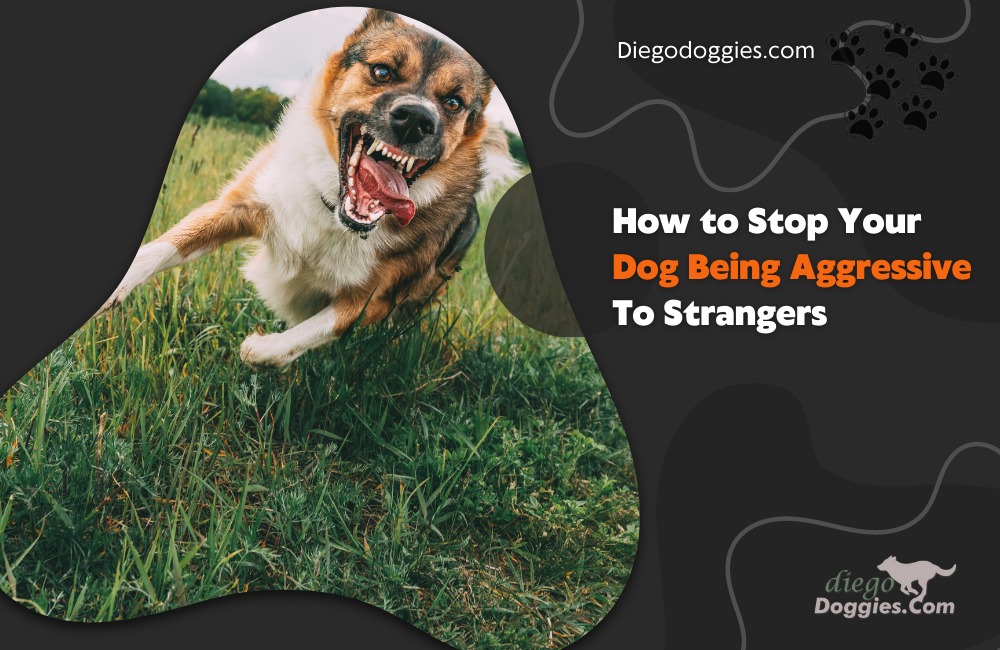Dogs show aggression towards strangers by barking, growling, or snapping at them. This behavior is often seen when a stranger comes into the dog’s home or yard, or when the dog is out on a walk and sees someone, it doesn’t know.
What Are The Consequences Of Aggression Towards Strangers?
The consequence of aggression is that it can lead to bites or attacks, which can cause serious injuries. Additionally, this behavior can scare people away, making it difficult for the dog’s owner to socialize their pet and have friends and family visit if the dog is particularly aggressive and is not restrained by chaining them up or locking them in an enclosure.
Why Is It Important To Train A Dog Not To Be Aggressive Towards Strangers?
It is important to train a dog not to be aggressive towards strangers because this behavior can be dangerous and lead to injuries. Additionally, it can make it difficult for the dog’s owner to socialize their pet or even take it to a dog park or walk where other people and their pets are present.
How Can You Train A Dog Not To Be Aggressive Towards Strangers?
The best way to prevent your dog from being aggressive to strangers is to socialize them from a young age. This means exposing them to different people, places, and situations so that they become accustomed to them.
Additionally, obedience training can help teach your dog to listen to and follow your commands, even when they’re around new people. Finally, it’s important to be aware of your dog’s body language and keep an eye out for any signs of stress or anxiety so that you can address them before they escalate into aggression.
If your dog is already exhibiting aggressive behavior towards strangers, there are a few things you can do to help correct the problem.
How You Can Train Your Dog To Stop Being Aggressive To Strangers
- Start with basic obedience commands such as sit, stay, come, and down by using an obedience training program.
- Make sure you are consistently rewarding your dog for good behavior around strangers.
- If your dog begins to show signs of aggression, calmly remove them from the situation and provide positive reinforcement when they display calm behavior.
There are books and online training courses to train you on how to go about obedience training.
Are There Dog Training Specialists That Deal With Aggressive Dogs
Yes, there are dog training specialists that can help you train your aggressive dog. These specialists can provide you with the guidance and support you need to help your dog overcome their aggression.
Additionally, they can offer recommendations on management techniques and behavior modification plans. If you’re concerned about your dog’s aggression, reach out to a professional for help.
What Is The Cost Of A Dog Training Specialist
The cost of a dog training specialist can vary depending on their experience and location. However, you can expect to pay anywhere from $50 to $200 per hour for their services. Some dog aggression is caused by fear or insecurity. If this is the case with your dog, they may benefit from behavior modification training.
Are There Behaviour Modification Training Courses You Can Buy?
Yes, there are behavior modification training courses available for purchase. These courses typically include a series of exercises and activities that are designed to help your dog overcome their fear or insecurity.
The cost of these courses can vary, but you can expect to pay one-off costs of anywhere from $50 to $200. When it comes to aggression, early intervention is key.
Do You Have Liability If Your Dog Bites Someone?
Yes, you may be held liable if your dog bites someone. Therefore, it’s so important to train your dog not to be aggressive and to take steps to prevent them from biting in the first place.
If your dog does bite someone, you could be faced with legal action, medical bills, and other damages. Dog bite liability insurance can help protect you financially if your dog does bite someone.
What should you do if your dog bites someone? If your dog bites someone, it’s important to take immediate action.
First, you should apologize to the person who was injured and make sure they receive any necessary medical attention. You should also exchange contact information with the person and report the incident to your insurance company.
Finally, you should take steps to prevent your dog from biting in the future. This may include training, behavior modification, or increased supervision. No one wants their dog to be aggressive, but unfortunately, it’s a common problem.
Frequently Asked Questions And Answers About Aggression
Conclusion
Aggression is a common problem among dogs, but it doesn’t have to be permanent. With the right training and behavior modification, you can stop your dog’s aggression and help them become happy and well-adjusted pets.
If you’re unsure of how to proceed, seek professional help from a qualified trainer or behaviorist. Remember, taken training action is the best way to prevent your dog from biting someone. With patience and consistency, you can help your dog overcome their aggression and enjoy a better life.
Act Now – Click HERE to learn about positive reinforcement training!
If your dog is barking at night, for example, there are a few things you can do to help train them to stop. By using force-free training methods, you can help your dog learn to Bark less at night and improve their behavior overall.

Related Contents
- 14 Easy Ways to Exercise Your Dog: Fun and Effective Methods
- 8 Therapy Dog Training Tips: How to Train Your Dog
- How Much Does Dog Training Cost? A Comprehensive Guide
- How to Make Crate Training Easy for Your Puppy
- How to Stop a Puppy from Biting You
- How to Teach a Dog to Smile: Fun and Easy Tips
- How to Train a Big Dog: Tips for Effective Obedience Training
- How to Train Your Dog to Roll Over in 7 Easy Steps
- Important Essential Training Tools for Dogs
- San Diego Dog Park Safety Tips, Training, and Dog Accessories
- Seven Top Tips: How to Train Your Dog to Hunt
Disclaimer: This article is intended to provide general information and is not meant to be veterinary advice.
If you have any concerns about your dog’s health or behaviour, please consult your veterinarian.

